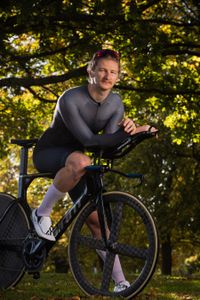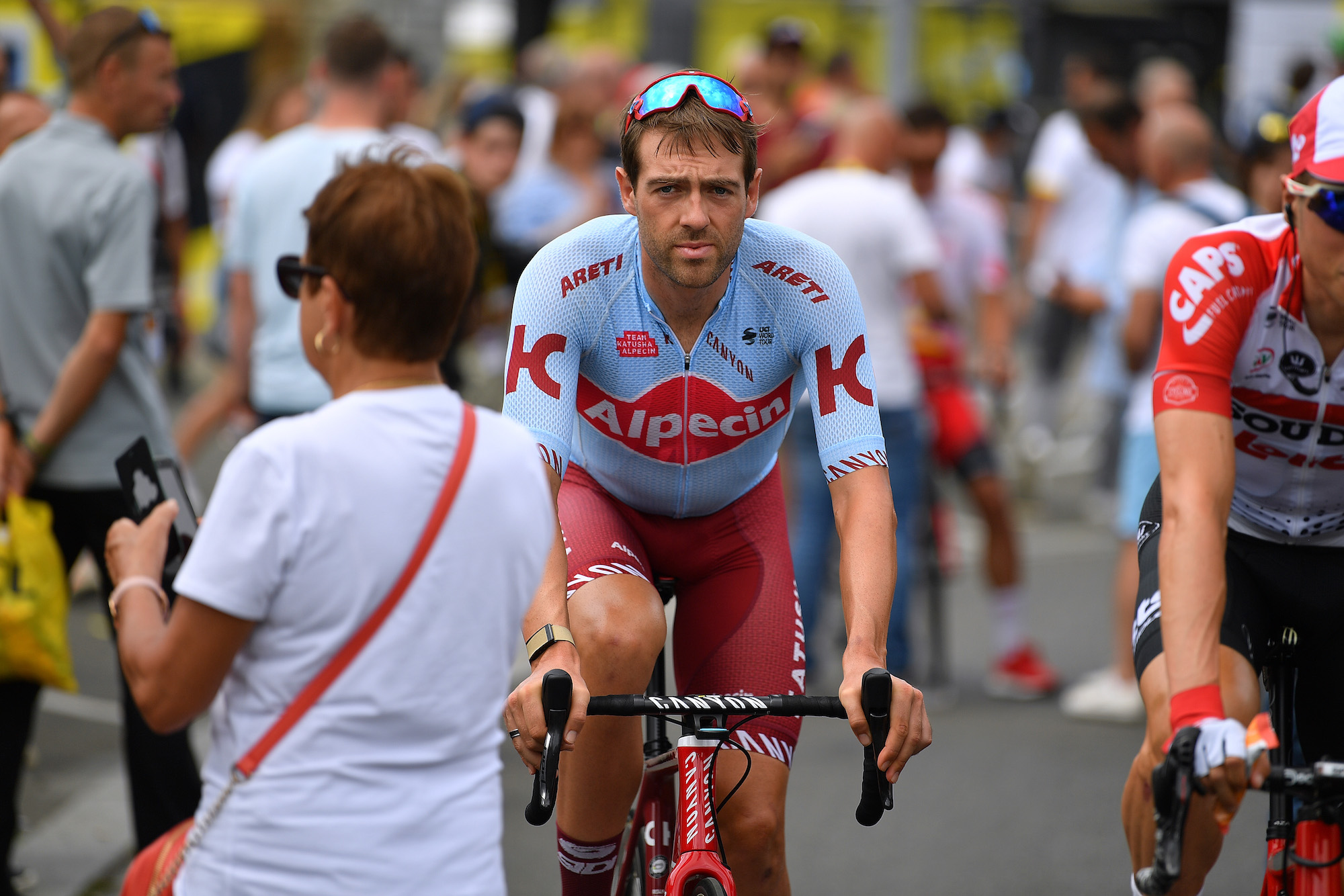‘You’ve got to enjoy the sacrifices’: British riders on how they got to race (and win) the Tour de France
Some of Britain’s biggest cycling stars give their insight on what it takes to reach the biggest race in the world


Alex Dowsett after stage 14 of the Tour de France 2019 (Photo by Justin Setterfield/Getty Images)
The latest race content, interviews, features, reviews and expert buying guides, direct to your inbox!
You are now subscribed
Your newsletter sign-up was successful
For decades, Britain’s cycling glories were sparse and sporadic, with riders from these isles an ocean away from their continental counterparts.
The honour of wearing the maillot jaune was reserved for those traditional great cycling nations – France, Italy, Belgium and Spain.
But in 2012 history was re-written when Bradley Wiggins carried home the yellow jersey, the first British rider to ever win the Tour de France and with the added prestige of doing it within a British team.
Just two years earlier, Dave Brailsford had taken the first small step towards British domination of the Tour de France by taking his regimented philosophy of elite sport from his Olympic track programme to the European cycling heartlands on the road.
As the 2019 Tour draws to a dramatic close, British riders are no longer the plucky underdogs revelling in winning the odd stage or donning the yellow jersey for a few brief stages, instead the Brits are reigning champions, general classification favourites, and future Grand Tour winners.
But what does it take for an intrepid young rider to bridge the channel to race, and even win, the biggest bike race in the world?
The latest race content, interviews, features, reviews and expert buying guides, direct to your inbox!
To get to the heart of the matter, Cycling Weekly asked the current and former pros at the Tour de France 2019.
“You really need to enjoy it,” said Mitchelton-Scott’s Simon Yates, the overall winner of the 2018 Vuelta a España and victor in two stage’s of this year’s Tour.
“You see a lot of guys that are super talented at a young age and they win a lot of races. Then they turn professional and it’s very hard to get wins. Some people don’t win ever.
“You’ve really got to enjoy the training side of it and all the sacrifices that go with it.”
Bury-born twins Simon and Adam Yates are the first wave in the next generation of British Grand Tour riders, both riding for Australian team Mitchelton-Scott and leading the line at the biggest races.
But the 26-year-old brothers took very different paths to the top-tier, as Simon followed the British track system and the British Cycling Olympic Academy, winning the World Championship points race in 2013, while Adam moved to France to race with support form the Dave Rayner Fund, which helps young riders start their racing careers on the continent.
“I started on the track, I did all that through my younger years,” Simon said.
”I decided I wanted to turn professional on the road, I’d done what I wanted to do on the track.
“I concentrated on the road, tried to go to the biggest amateur races, tried to do well there. I won some good races and I managed to get a contract with a team.”
Simon’s breakthrough performance came in the 2013 Tour of Britain while riding for the national team, when he won stage six in Devon and finished third overall, 1-03 behind winner Bradley Wiggins.
The following year both Simon and Adam were signed by WorldTour team Orica-Greenedge, now Mitchelton-Scott, where they are both given opportunities to lead the team in Grand Tours.
On his steps to the Tour de France, Simon said: “To get to the Tour I was a bit lucky. My first Tour was in my neo-pro year, because we had so many guys injured and who got sick, I was one of the very last guys to make the team.”
Yates’s emerged as a three-week contender at the 2017 Tour, his third edition of the race, when he won the young rider classification and finished seventh overall.
After coming within days of winning the 2018 Giro d’Italia before a dramatic collapse, Yates then reached the top step in last year’s Vuelta a España, becoming only the second British rider to win the Spanish Grand Tour after Chris Froome (Team Ineos) a year earlier.
But riding the Tour de France is not just about racing for stages and fighting for the overall, as there are plenty of British non-general classification contenders in the professional peloton.
Katusha-Alpecin’s Alex Dowsett is one such rider, having driven Marcel Kittel’s lead-out train while also chasing his own opportunities in individual time trials.
Dowsett, from Essex, is also a Giro d’Italia stage winner and a six-time national TT champion who has ridden for Team Sky and Movistar.
The 30-year-old started time trialling at a young age before being picked up by the British Cycling system, joining the now-famous British Cycling Academy which kickstarted the careers of Geraint Thomas and Mark Cavendish.
“My route was normal to start with and then it wasn’t,” Dowsett said. “I started time trialling when I was 13 and I got picked up by the British Cycling talent team, then I progressed onto the Olympic development programme, which is basically the junior GB squad and I did plenty of track. Then I went onto the academy.
“My first year with the academy I was still at school, then I finished my A-levels and went full time.”
But Dowsett found that the academy wasn’t set up to develop the skills of a strong time triallist like himself, with the European headquarters being set in the rolling hills of Tuscany.
“Italy wasn’t working for me. I’m not a climber and I was in a country where it was all about climbing.
“I went through three years and the best result I had was seventh in an under-23 Italian race and that was because only 11 riders finished because it was raining.
“That year I thought it was all over, but I managed to salvage it at the Worlds.”
Dowsett finished seventh in the 2009 U23 World Championship time trial and drew the attention of Trek-Livestrong, the US continental team run by Axel Merckx , now Hagens Berman Axeon.
He followed up with strong time trial results in 2010, including a second place finish in the Commonwealth Games TT and winning the Chrono des Herbiers in France, signing with Sky Procycling the following year, in the team’s second season.
“My advice to youngsters is to go to a country that suits you to race,” Dowsett said.
“If you’re a climber, don’t go to Belgium and if you’re a sprinter don’t go to Italy.
“Now there’s a whole host of pathways. The spread of teams there are for development is really good, but you can’t get too hung up.
“It might take you five years to go pro or it might take you a year, or you might be like [Remco] Evenepoel and go pro straight away but it doesn’t matter. You shouldn’t put a time limit on it.
“Treat every year like an opportunity.”
In years past, a young British rider might have held a distant and no-hope dream of winning the Tour de France, but in 2012 that changed when Sir Bradley Wiggins reached the top step in Paris.
Since that milestone, there have been three different British riders to win the Tour de France, after Froome claimed his first Tour victory in 2013 and Geraint Thomas (Team Ineos) defied the odds last season.
But what does it take to be a Tour winner?
In between his stints riding alongside peloton as a motorbike reporter for Eurosport at the 2019 Tour, Wiggins shared his words of wisdom with Cycling Weekly.
“I came through the track system, with success at the Olympics,” said Wiggins, who retired in 2016.
“It was always a good basis to predict whether someone had a good engine or not.
“G [Geraint Thomas], Simon Yates, Mark Cavendish, we all came through that track system. That’s where the first success in British cycling was, then obviously from that [Team Ineos] has developed.”
After plenty of success on the track at junior level, Wiggins won his first Olympic medal in 2000, silver in the team pursuit in Sydney, and the following year was signed to the ill-fated Linda McCartney team, which disbanded that year.
Wiggins made his Tour debut in 2006 with French outfit Cofidis, but it wasn’t until 2009 when he finished fourth on general classification with Garmin-Slipstream that he became a serious contender to win the yellow jersey, and he joined Sky Procycling the following year to pursue that dream with Sir Dave Brailsford.
On whether he would change anything from his career, Wiggins said: “It is what it is, you can’t change it now. I was pleased to fulfil my ambitions.
“It’s a lot more professional now, more elite. Elite sport is so brutal. It’s not conducive to normal life and marriage and kids. I’ve had kids since I was 24, it was quite tough.
“I’m happy I am where I am now and that I’m me. I’m glad I got the opportunity to do what I did.”
With a combined 33 years of experience as professional cyclists between then, what is the best advice these three British stars can give to a young rider?
“I wish I’d been a bit more serious when I was younger,” Wiggins said.
“I went into Cofidis and they were a sack of s*** compared to what riders go through now. Young riders coming into Ineos, like Tao [Geoghegan Hart] have got such a great pathway.
“It’s like going into Manchester City or Liverpool at 19.”
Dowsett’s top tip: “You can go to a big team and not get raced much, or you can go to a smaller team and get a lot more opportunities.
“See the smaller team as as much of an opportunity as the big team to move forward.”
But it was Yates who offered possibly the most grounded advice for any young rider hoping to develop into world-class cyclists: “I always remember what my old direct Keith Lambert told me when I was racing in some really small races as an amateur. We were in a rough hotel in the middle of nowhere, the food was terrible, the beds were rock hard, and he said to me ‘this is cycling. It doesn’t change, when you go to the Tour de France it’s the same.’
“It’s exactly the same now. We stay in some of the same hotels we did then. Nothing has changed except I travel around in a shiny bus."
“That always stuck with me. Is this what I want to do, do I want to stay in s***y hotels all my life? Well here I am.”
Alex Ballinger is editor of BikeBiz magazine, the leading publication for the UK cycle industry, and is the former digital news editor for CyclingWeekly.com. After gaining experience in local newsrooms, national newspapers and in digital journalism, Alex found his calling in cycling, first as a reporter, then as news editor responsible for Cycling Weekly's online news output, and now as the editor of BikeBiz. Since pro cycling first captured his heart during the 2010 Tour de France (specifically the Contador-Schleck battle) Alex covered three Tours de France, multiple editions of the Tour of Britain, and the World Championships, while both writing and video presenting for Cycling Weekly. He also specialises in fitness writing, often throwing himself into the deep end to help readers improve their own power numbers. Away from the desk, Alex can be found racing time trials, riding BMX and mountain bikes, or exploring off-road on his gravel bike. He’s also an avid gamer, and can usually be found buried in an eclectic selection of books.
